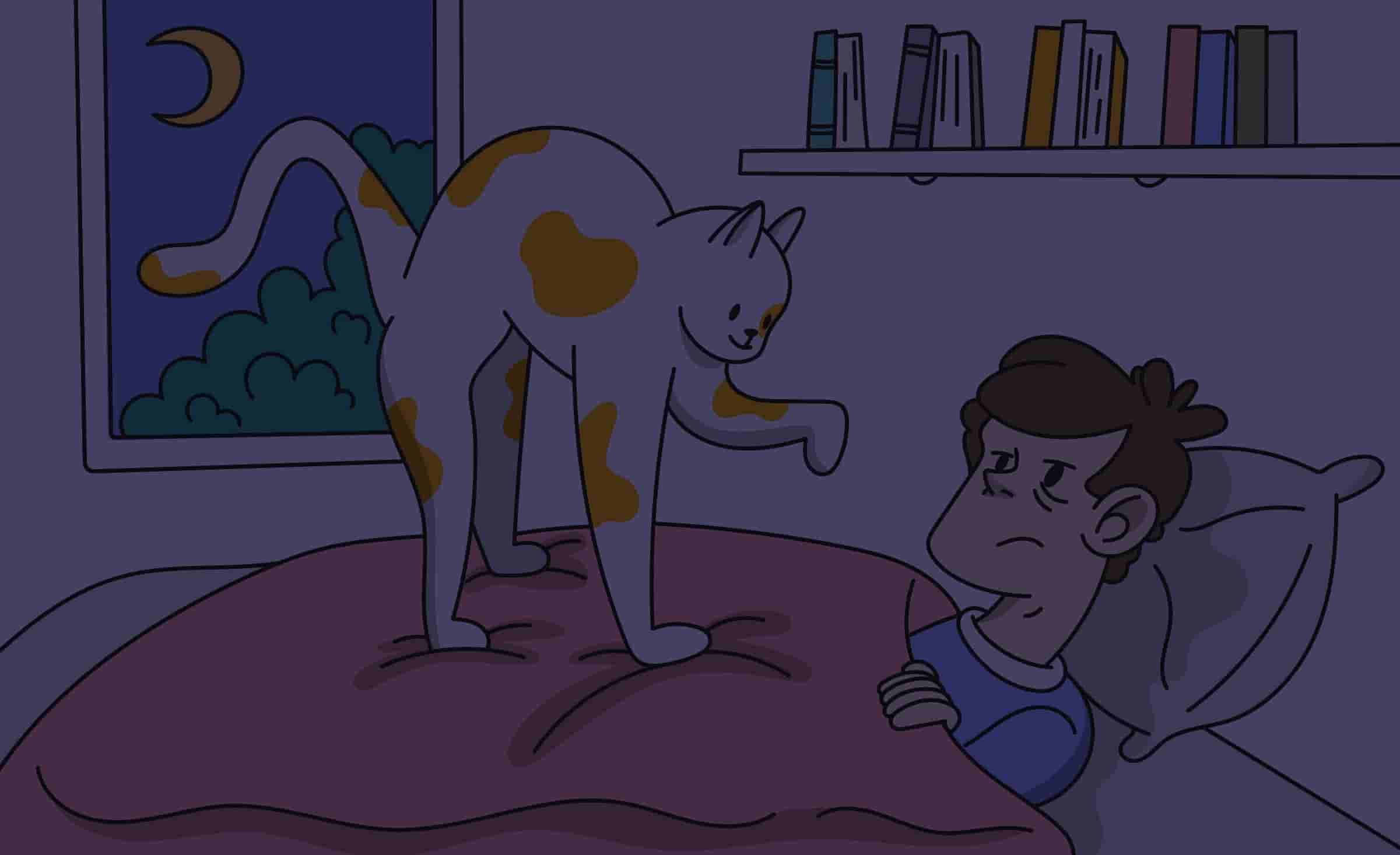Felines have perfect night vision, high energy level, and indeed enjoy late-night walks (or hunting sessions?) and loud meows. With dozens of stories of cats waking up their pawrents, a question arises — how to get cats to sleep at night?
Some kitties just enjoy nighttime meows more than anything else. But what if such behavior actually interrupts your sleep and bothers you every night? Let’s find out why cats are most active at night and how to make them sleep.
Causes of cat’s activity at night
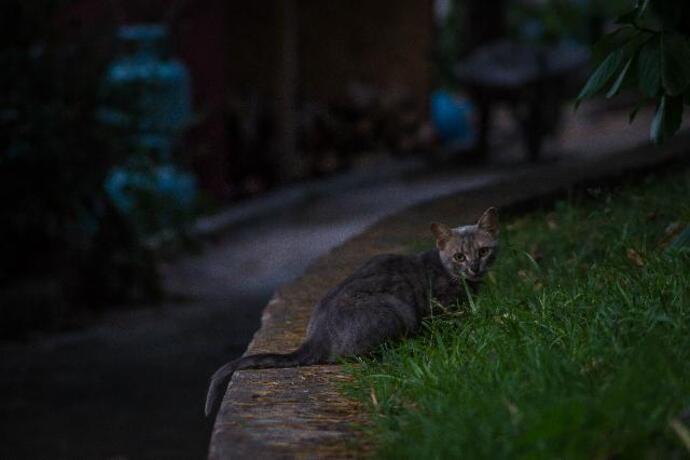
Because cats are so active at night, you might wonder if they’re such night stalkers as humans think of them. Felines are crepuscular animals meaning they are more active during dawn and dusk than at any other time of day. If you live near a field or wooded area, you may have noticed that you see or hear more wildlife in the morning and evening.
Humans might hear a cat meowing at night or moving around the house and think that this activity is happening in nighttime hours. In reality, our feline friends are often more active during early dawns rather than around midnight.
Besides cats’ natural behavior pattern of hunting and roaming during dusks and dawns, there might be other reasons that contribute to your cat crying at night excessively. Read on to find out why your cat is meowing at night and how to get them to sleep.
Catnaps
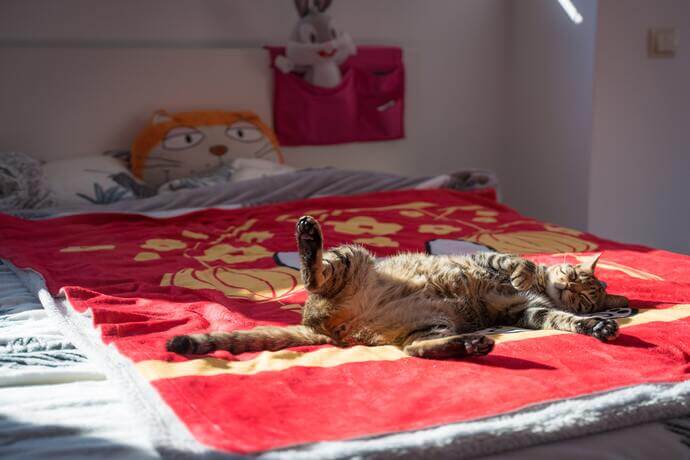
Have you ever wondered what your cat is doing while you’re at work? Instead of playing, your kitty might be taking a catnap (pun intended). Naturally, felines who sleep all day will be most active at night, continually messing up with your sleep schedule.
Hunting instincts
When it comes to domesticated cats, they still follow the hunting instincts of their ancestors, telling them that dawn is the best time to hunt. As your cat won’t find any real prey in the house (we hope), your toes, curtains, and plants would do just fine.
Hunger
It’s only natural that when your cat is hunting, running, and jumping all night long, they will eventually become hungry — a vicious circle solution to which you’ll discover later in the article. And what happens when they see an empty bowl with no yummy kibble? Loud meowing, yowling, and waking you up!
Boredom and attention-seeking
Cats are social animals, and they need your attention during the day. If your kitty feels neglected, they might wake you up to play and get petted. Cats also need a lot of physical and mental stimulation. Otherwise they may yowl at night out of sheer boredom.
How to get a cat to sleep at night
So, your cat pounces on you in the middle of the night or runs around at night, meowing and yowling so loud you can’t sleep. Before you read on to learn some easy solutions to your cat’s active night life, do note that cats are often hard to train, so have patience and be consistent with what you are doing.
Let’s find out how to how to get cats to sleep at night.
No attention at night
As stated by Animal Humane Society, people often encourage cats’ nighttime activities without actually intending to do so. If you give in and feed, play, or actively interact with your cat at night, you unintentionally reinforce their nighttime behavior. Much as you have to ignore your dog begging for food, try not to pay attention to your cat’s night shenanigans.
Please note that you shouldn’t punish your cat for being active at night. You have to understand that nighttime meows, yowls, and jumps are just a part of feline’s natural behavior, and they don’t intend to disturb or annoy you.
Exercise and mental stimulation
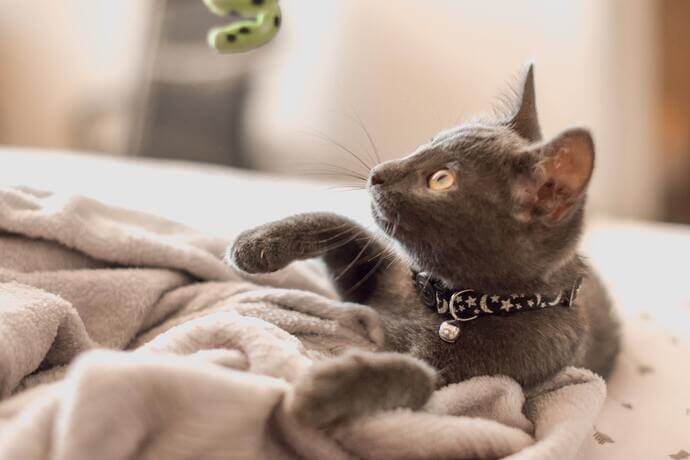
Previously, we made it clear that felines can take snooze all day long, especially when left home alone. If your kitty has already slept throughout the day, the odds are high that your sleep will be interrupted.
If your cat cries at night as a habit, provide them enough physical and mental stimulation before bedtime. Feel free to experiment with toys that encourage your cat to stay physically active, like laser pointers. This way, your cat will spend more energy and will likely enjoy nighttime sleep as much as you do.
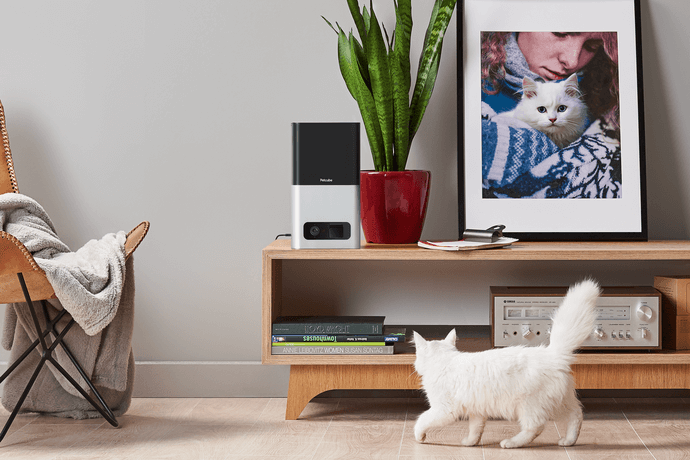
We all know that spending an entire day entertaining our cats is not always possible because of work and other routines. Luckily, pet parents can interact with their four-legged friends remotely via pet cameras.
With a treat-dispensing camera, you can not only watch your cat, but also toss them their favorite treats while being away. Some cameras also allow you to entertain your cat remotely with a laser pointer.
A cat-free zone
If you’re extremely sensitive to noise or already suffer from sleep deprivation, try to manage your own space differently. Some of the options include crating a cat at night or leaving your four-legged friend in another room.
If crating is not possible, and you made your mind to keep a cat out of the bedroom at night, leave a litter box as well as bowls with food and water as far from your room as possible. Sometimes, separation works well for some cats, making it a great solution to improve your sleep quality.
Feeding changes
In some sense, the felines’ digestive system is similar to humans. If you have a meal before bedtime, you’re likely to experience light drowsiness. Cats react similarly, so you can adjust the feeding schedule to work better with nighttime hours.
If switching to late-night meals didn’t work, experiment with the type of food you feed your cat. Try to avoid giving your cats high-carb food, like sweets and fruits before bedtime, as they can boost your cat’s energy level. Go for proteins instead — meat and fish work well for cats’ digestion and will hopefully make your cat more sleepy.
Research states that stronger daytime activity is observed in cats on dry food diets. What’s the takeaway? Try replacing your cat’s usual meal with dry kibble during the day and see whether your cat’s activity change over time.
Takeaway
Cats, as crepuscular animals, follow a different schedule than we humans. You might feel overwhelmed, tired, or even frustrated by your cat’s nighttime activity, but try to stay calm and understand that felines don’t act this way to anger you. In most cases, they wake you up in the middle of the night out of boredom, hunger, lack of attention, and stimulation during the day.
Luckily, there are plenty of ways to adjust your cat’s sleeping schedule. Start by ignoring your kitty’s nighttime activities but don’t punish your cat for this behavior. If your furkid bothers you too much, consider crating them or leaving them in the other room. As a rule, try to provide more exercise before bedtime and adjust the feeding schedule.
But most importantly, stay calm and consistent since changes won’t arrive overnight.
Was this article helpful?
Help us make our articles even better

